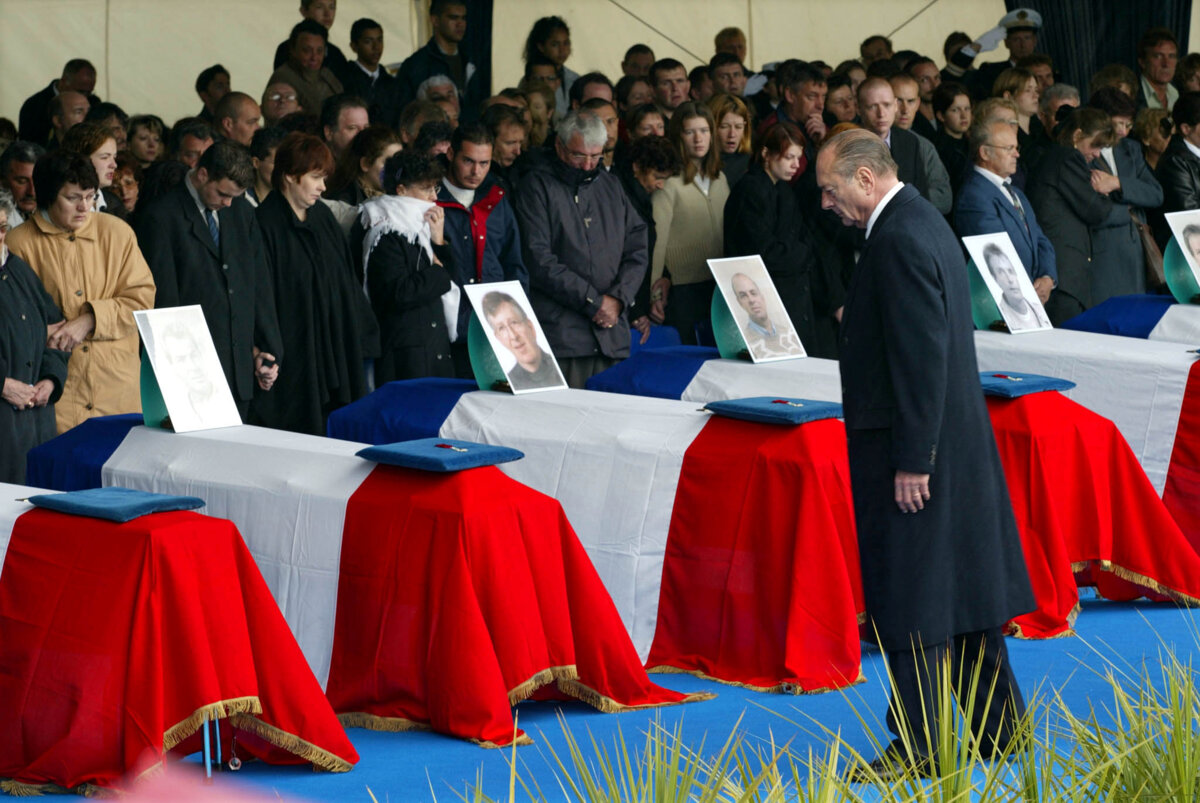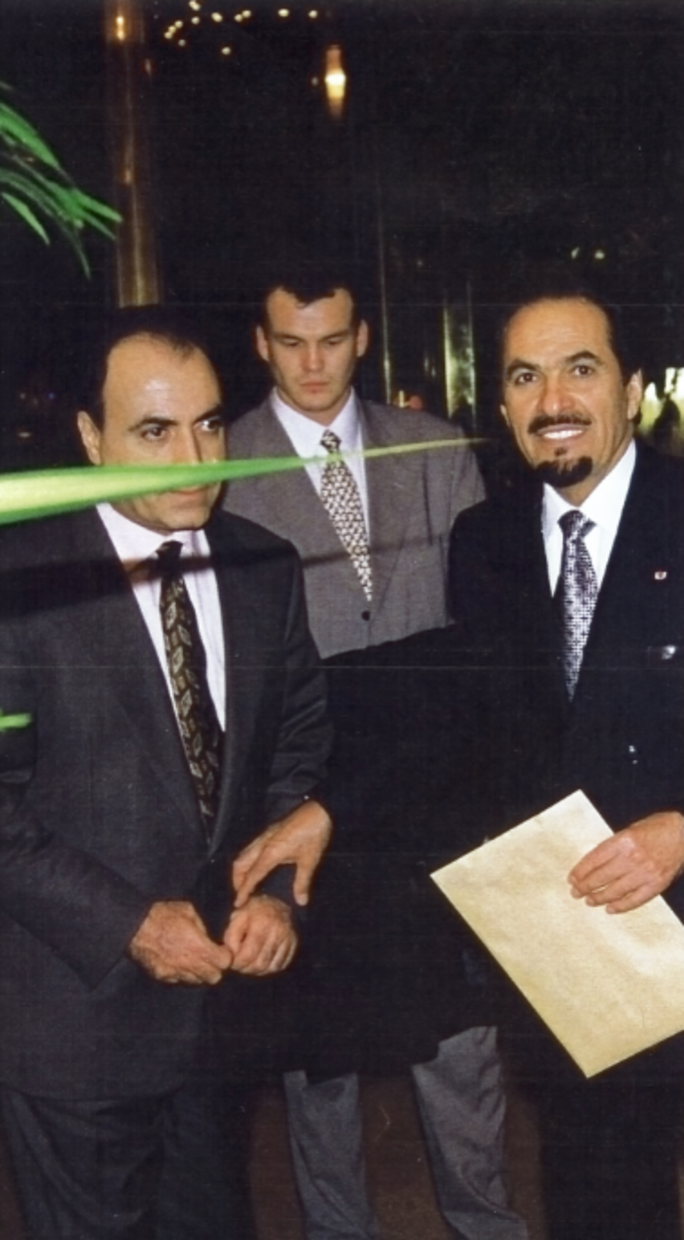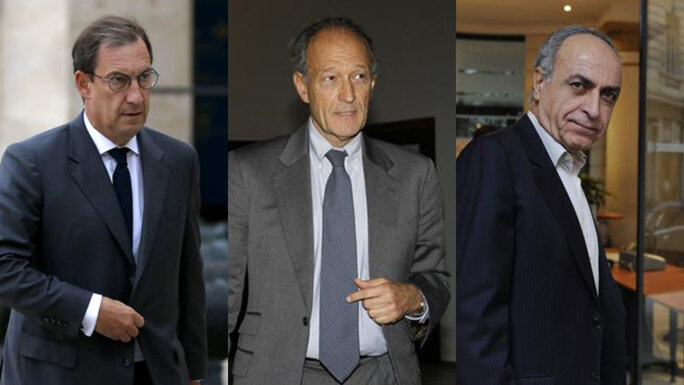For three weeks they have been a largely silent presence in the Paris courtroom. These are the individuals who have joined as civil litigants to the criminal proceedings over the financial aspect of the so-called Karachi affair. They are also the survivors and families of the victims of the bus bombing on May 8th 2002 in Karachi which killed 14 people, including 11 French employees of France's defence contractors the Direction des Constructions Navales (DCN), now the Naval Group, working on the delivery of submarines sold by the French state to Pakistan.
The court is examining the hidden financial background to the arms contracts signed by the French government under conservative prime minister Édouard Balladur (1993-95). Three contracts were with Saudi Arabia and one with Pakistan for the supply of Agosta submarines. It was while helping to fulfill this deal that the DCN staff lost their lives nearly two decades ago.

Enlargement : Illustration 1

A judicial investigation unearthed astronomical hidden commissions totalling 173 million euros, including 11 million in cash, in connection with the four contracts. According to the judges who led the probe into the affair, some of this money later made its way back into French political life as so-called retro-commissions. These were allegedly used to fund Balladur's presidential campaign and as slush fund money for the Parti Républicain led by François Léotard, the minister of defence at the time and the minister who signed the defence contracts.
It is solely this issue of finance – the intricate offshore financial set-ups, the ferocious political appetite for money and some of the secrets of France's military-industrial complex – that the Paris court has been examining since October 7th.
But the reason why survivors and families of victims of the 2002 attacks are present in court is because a theory has emerged since 2008 of a possible connection, direct or indirect, between the financial aspects of the contracts and the motives for the 2002 attack.

Enlargement : Illustration 2

From 2002 to 2008, right up until Mediapart's first revelations on the subject, France's DCN hid from the justice system private intelligence reports which, if not proving it, mentioned the existence of a potential link between the blood and the money. This concerned the decision by the newly-elected President Jacques Chirac – who had beaten his rival Balladur to the presidency – to stop paying from the summer of 1996 what remained of the commissions due on the contracts (about 150 million euros) to a triumvirate of middlemen used by the Balladur team, including the Saudi Arabian Ali Ben Moussalem. Ali Ben Moussalem, who died in 2004, was flagged by the CIA and the United States Treasury Department over involvement in funding terrorism.
These intelligence documents, known as the Nautilus reports and written by a former French counter-intelligence agent, attributed the organization of the 2002 Karachi attack to the Pakistan intelligence service the Inter-Services Intelligence (ISI), which was known for its double dealing with terrorist organizations. The 2002 attack took place four months after the decision by the Pakistani prime minister Pervez Musharraf to sever ties with the most radical fringe within the ISI which then, according to the Nautilus reports, decided to take up the case of the unpaid commissions.
The attacks also took place three days after Jacques Chirac's re-election in May 2002. On May 13th, five days after the attacks, Chirac spoke publicly at Cherbourg in northern France about what he called “blackmail”.
A French anti-terrorism investigation into the Karachi bombing – led today by Judge David De Pas, having been headed first by judges Jean-Louis Bruguière and then Marc Trévidic – is still ongoing. So far the investigation has not yet established the truth of what happened, even if the theory that the bombing was simply an Al Qaeda attack has gradually been discounted. And the judges have still to prove with any certainty that the motive for the deadly attack was financial.

Enlargement : Illustration 3

Meanwhile, beyond the theories and counter-theories which have ranged around the Karachi affair for more than ten years, the financial aspect of the cases currently being examined in court has led to an encounter between two very different worlds whose paths normally never cross.
On one side is the white-collar world, with its power, money, privileges and also vanity. Among the defendants this white-collar world is represented by the former minister Renaud Donnedieu de Vabres, who was defence minister Léotard's special adviser, the number two at luxury goods group LVMH Nicolas Bazire, who was Balladur's chief of staff and election campaign director, Thierry Gaubert, who was an advisor at the time to then budget minister Nicolas Sarkozy, Dominique Castellan, who headed the DCN, and middleman Ziad Takieddine.
Then there is the blue-collar world. This consists of people from lower walks of life, of workers, of the daughters, sons, widows, brothers and sisters of those workers who died in the 2002 attack, people who have displayed both their anger and their dignity. On Monday 21st October this world was represented in court by two witnesses called to give evidence: Sandrine Leclerc, a professor of biotechnologies who lost her diesel mechanic father Jean-Yves in the Karachi attack, and Gilles Sanson, a survivor of the bombing, who had been sent to Pakistan by DCN to handle the manufacturing of the torpedo launch tubes that were due to be fitted to the submarines.
They did not speak for long, in fact for hardly any time at all compared with the scale of the month-long trial. But in that short time they said a great deal.
In a voice that at times quavered before recovering again, Sandrine Leclerc read out the words she had written down to ensure she forgot nothing of what she wanted to say. There was, however, one expression that she used in the witness box which did not feature in her typed version: “It's just crazy!”.
This cry from the heart came at the end of a lengthy attack directed at the accused.
She told the court: “We've fought 17 years for justice to be delivered! We've been waiting for 17 years for the first trial! We've been trying for 17 years to hold our family lives, our professional lives together, through thick and thin....we have refused to heal this wound which has ruined our lives. And for what? To hear them lie, to hear them complain, to hear them shirk their responsibilities. We are perhaps merely the wives, daughters and sons of workers, as we have often been made to feel, but we do have dignity, morality and a sense of responsibility.”
Sandrine Leclerc continued: “We are convinced that without the financial misappropriation linked to the execution of the arms contracts, without the existence of these retro-commissions, without the fact that France's word could not be honoured, our husbands and our fathers would not have been murdered. Everything is linked! To claim otherwise is denying the evidence.”
The witness spared no one in her evidence. Not Dominique Castellan and his lack of words of comfort for the victims' families; not Nicolas Bazire for his timely amnesia; not Thierry Gaubert and his “attacks” on his ex-wife, who gave evidence against him during the investigation; not Ziad Takieddine who was “worried about his yacht”.
Sandrine Leclerc continued: “The collective strategy of the accused can be summed up as: 'Move along please, there's nothing to see here!' They all went so far as to congratulate themselves for the great success of the signing of these fraudulent contracts. Fourteen dead, 12 injured. What a success indeed! No one in France has done better since.”
Then came Gilles Sanson's turn. “I was in the bus and I'm going to take you there,” he told the court, referring to the bus that he and his “mates” from DCN were on in Karachi at 7.45am on May 8th 2002, when the explosion intervened. And changed the course of his life.
“I find it very hard to hear it said that this contract was of major importance to employment in Cherbourg [in northern France]. It's a lie,” he began. Then, nodding towards the ranks of the accused, he said: “Those people there played, those people there lost.”
Gilles Sanson, too, believes that the theory of a link between the arms deal corruption and the attack is “plausible”. He focussed on the role of the middleman Moussalem, and his suspected connections both with terrorism and with Pakistan's ISI. “Well yes, Mr Bazire, France awards Légions d'Honneur [editor's note, state honours] to people who finance terrorism [editor's note, Ali Ben Moussalem was awarded the Légion d'Honneur], he said angrily to the accused.
When it came to talking about the attack itself, Gille Sanson's voice started to break, his words stumbled and tears began to flow. The president of the court, Judge Christine Mée, told him to take his time. Other survivors who were present in the courtroom also struggled to contain their emotion. “It all suddenly came back,” explained one survivor when the hearing ended.
Gilles Sanson spoke at length about a forgotten victim of the whole saga, a woman called Mewa Begum. She was a beggar who died in the attack. The Frenchman, who miraculously did not lose consciousness in the attack but who was seriously wounded in the leg – the “bone was mashed” as a doctor put it – had been in the same ambulance as the beggar's corpse.
Sanson gave his evidence to hushed silence. “I loved my employer, I loved my country, I loved my flag. Today I hate my employers, I no longer have a country and I no longer have a flag,” he said.
Two days later it was the turn of the lawyers representing these civil parties to plead their cases. Criminal lawyer Olivier Morice, who represents the families of several victims including Sandrine Leclerc, has handled their cases since 2008 and was the man who began the formal complaint that started the whole proceedings. He attacked the “profound cynicism” which surrounded the case. Addressing himself to the ranks of the accused, he said: “You are the perfect illustration of the cynicism of a Republic which in certain respects has been corrupted.”
Lawyer Marie Dosé, who represents other survivors and victims' families, including Gilles Sanson, defended the honour of her clients who were “not parties who don't' understand this case at all and who will be manipulated”. She said: “Some know this case almost down to the last comma, almost down to the last statement...”
Setting out how the Nautilus reports not only enabled the suspected financial abuses over the arms deals to be unearthed (the subject of the court case), but also how they revealed the possible link with the attack itself (still under investigation), Marie Dosé said: “People kill over millions. In investigating the misuse of corporate assets, you are investigating the causes of the attack. The state has become mixed up with the worst for the sake of money.”
The lawyer then referred to Gilles Sanson's comments about him feeling he no longer had a country or flag because of the Karachi affair, and ended her address to the court by pointing out that her clients did still have one thing left to them - and that was “justice”.
The accused deny charges of misuse of corporate assets or of complicity in the receipt of misappropriated corporate assets.
----------------------------------------------------------------------------
- The French version of this article can be found here.
English version by Michael Streeter


